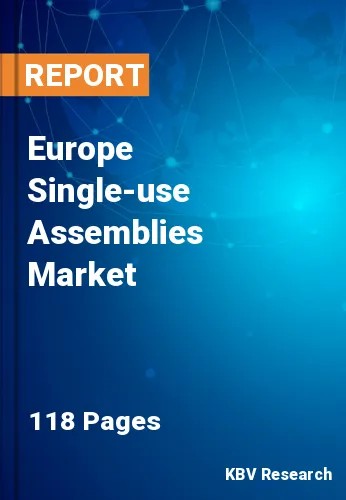The Europe Single-use Assemblies Market would witness market growth of 22.9% CAGR during the forecast period (2022-2028).
Prior to manufacturing, each component is determined and recorded on a drawing that is delivered to the customer for approval. Each drawing is assigned a unique number for purposes of quality and identification. After the end-user has approved the design, assembly and packing are performed in an ISO-certified cleanroom. Reducing the single-use complexities for both consumers and suppliers improves quality and robustness, ensures availability, and reduces the overall cost of the supply chain.
Standardization will not impede differentiation among single-use vendors, who are not required to rely on functional design fundamentals. Multiple aspects associated with implementation at end-user locations contribute to differentiation. The true value added by single-use suppliers is not decided by what they do, but by how they do it. That is characterized by a blend of single-use product characteristics and nonproduct characteristics.
These may include filter membranes, specific material-quality attributes, like robustness or cell-growth characteristics, supply assurances, documented qualification packages, single-use system integrity (SUSI) strategies, quality control systems, technical support capabilities, delivery reliability and capabilities, and other competencies. Therefore, single-use vendors have no need to fear uniformity of dimensions.
The adoption of technologies within the healthcare sector of Germany is significantly high. According to the International Trade Administration, Germany has the third largest market for medical technology in the world as well as the largest market in Europe, with twice the size of the French market and three times that of the United Kingdom, Italy, and Spain. The German market for medical devices is one of the most lucrative in the world, accounting for around USD 35.8 billion yearly, or 25.6% of the overall European market.
The Germany market dominated the Europe Single-use Assemblies Market by Country in 2021, and would continue to be a dominant market till 2028; thereby, achieving a market value of $565.6 million by 2028. The UK market is anticipated to grow at a CAGR of 21.9% during (2022 - 2028). Additionally, The France market would exhibit a CAGR of 23.8% during (2022 - 2028).
Based on Solution, the market is segmented into Standard Solutions and Customized Solutions. Based on Product, the market is segmented into Bag Assemblies, Filtration Assemblies, Bottle Assemblies, Mixing System Assemblies, and Others. Based on End User, the market is segmented into Biopharmaceutical & Pharmaceutical Companies, CROs & CMOs, and Academic & Research Institutes. Based on Application, the market is segmented into Filtration, Cell Culture & Mixing, Storage, Sampling, Fill-finish, and Others. Based on countries, the market is segmented into Germany, UK, France, Russia, Spain, Italy, and Rest of Europe.
Free Valuable Insights: The Global Single-use Assemblies Market will Hit $8.6 Billion by 2028, at a CAGR of 23.4%
The market research report covers the analysis of key stake holders of the market. Key companies profiled in the report include Thermo Fisher Scientific, Inc., Sartorius Stedim Biotech S.A. (Sartorius AG), Danaher Corporation, Merck Group, Avantor, Inc., Parker-Hannifin Corporation, Saint-Gobain Group (CertainTeed), Corning Incorporated, Repligen Corporation, and Entegris, Inc.
By Solution
By Product
By End User
By Application
By Country
Our team of dedicated experts can provide you with attractive expansion opportunities for your business.

